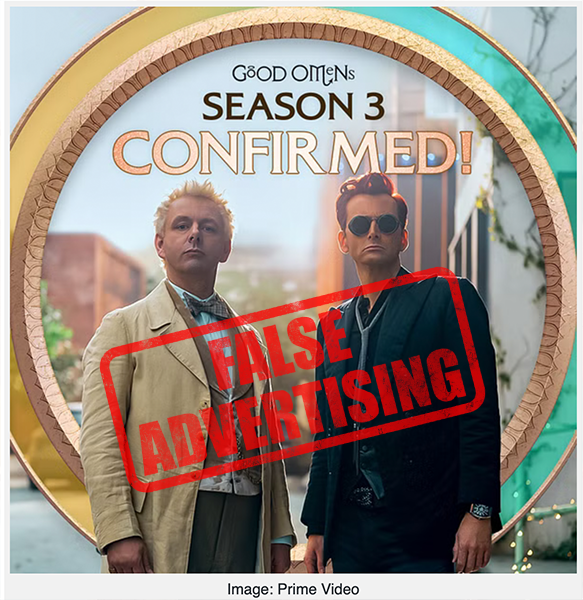When Cancellation Isn’t Cancellation - It’s A Breach
When Good Omens first premiered, it wasn’t just another prestige series. It was a miracle. A tender, funny, richly layered story about an angel and a demon whose relationship—spanning millennia—became one of television’s most nuanced and explicitly queer-coded love stories. It offered something rare: representation without apology, without reduction, without tragedy. It became more than a series. It became a promise. Now, Prime Video has decided to break that promise, and in doing so, it may find itself navigating not just fan outrage but the sharp end of contract law.
A Complete Season, Casually Condensed
The six-episode third season of Good Omens wasn’t a speculative idea. The scripts are written. The narrative arc exists. Neil Gaiman, the show’s co-creator, completed his stewardship of the story’s final chapter before stepping away from the production. This isn’t a matter of creative uncertainty or unforeseen logistical constraints. This is a deliberate decision to shelve a finished work and replace it with a 90-minute “finale” that, by every reasonable standard, fails to deliver what was promised.
Marketing Hype Meets Legal Liability
Prime Video’s decision is not simply disappointing. It may be actionable.
Publicly announced production plans—especially those backed by official marketing campaigns and direct communications from a studio or its creative leads—constitute what courts have routinely recognized as “representations” to consumers. When those representations induce reliance, whether financial (subscriptions, merchandise purchases) or otherwise (viewer engagement that drives ad revenue and platform metrics), the failure to deliver can give rise to liability.
Bad Faith Isn’t Just A Feeling – It’s Legal Doctrine
The principle at stake is the implied covenant of good faith and fair dealing, a legal doctrine recognized in Restatement (Second) of Contracts § 205 and upheld in cases such as Market Street Associates Ltd. Partnership v. Frey, 941 F.2d 588 (7th Cir. 1991). As Judge Richard Posner wrote in that decision, “A party to a contract cannot be permitted to take opportunistic advantage in a way that could not have been contemplated at the time of drafting.” Prime Video marketed a six-episode season. Fans subscribed and stayed subscribed based on that commitment. To now reduce that commitment to a single feature-length episode—without explanation, remedy, or acknowledgment—qualifies as exactly the sort of opportunism the courts have warned against.
False Advertising By Omission
But it doesn’t stop there.
False advertising claims under both state and federal law may also apply. The Federal Trade Commission Act (15 U.S.C. § 45) prohibits “unfair or deceptive acts or practices in or affecting commerce.” Prime Video’s public statements and marketing campaigns—promoting a full six-episode conclusion—created reasonable consumer expectations. If those expectations are not met without adequate disclosure or remedy, Amazon may be engaging in deceptive business practices. California’s Consumers Legal Remedies Act (CLRA), Cal. Civ. Code § 1750, likewise protects consumers from misrepresentation of goods and services, and could provide the basis for class action claims. With hundreds of thousands of fans already mobilized via petitions and letter-writing campaigns, Prime Video’s exposure is far from theoretical.
There is also the potential for tortious interference with contractual relationships. While Neil Gaiman’s role in the production may have shifted following the controversy surrounding him, the legal fact remains: no criminal charges have been brought, and no court has adjudicated wrongdoing. If Prime Video’s decision to reduce Good Omens to a 90-minute feature is driven by reputational concerns rather than concrete legal obligations, it may be breaching contracts with other parties or interfering with the performance of existing agreements. Courts have held that reputational risk alone does not justify contract violations, as in Redgrave v. Boston Symphony Orchestra, 855 F.2d 888 (1st Cir. 1988).
And yet, it’s not just about legal doctrine. It’s about the story itself. Good Omens is not an interchangeable IP. It is a rare example of queer representation handled with grace and respect, offering a slow-burn, genre-defying relationship that resonated deeply with LGBTQ+ audiences. The decision to truncate its conclusion—despite a finished season’s worth of scripts—feeds into a larger pattern we’ve seen too often: queer stories sidelined the moment they become inconvenient.
Good Omens isn’t just another show. It’s a cultural landmark. Its audience has been promised an ending—a six-episode ending that honors the complexity and richness of its story. And if that promise isn’t honored, there will be consequences. Not just from petitions, letters, and social media campaigns (though those are significant), but in the courts. Legal precedent is clear: promises made to consumers, leveraged to drive financial or reputational gain, cannot be casually revoked without risk.
It’s true that principal filming may have ended for Good Omens, but this alone doesn’t foreclose the possibility of restoring the original vision. It’s common industry practice for productions to recall actors and crew for reshoots or additional filming, especially when complete scripts already exist—as they do here. Major productions like Marvel’s Avengers: Endgame and HBO’s Game of Thrones famously recalled actors after initial filming wrapped to ensure the narrative met creative and audience expectations. Given that the scripts for the planned six episodes are completed, the logistical hurdles for Amazon to fulfill its original commitment would be relatively minimal compared to starting anew. More importantly, honoring this promise would reaffirm trust with subscribers—a crucial step toward maintaining customer loyalty—and spare Amazon from imminent legal proceedings, which Watchdog Media Group has learned are prepared and ready to file should the platform attempt to deliver anything less than the six episodes originally promised.
The demand remains simple. Restore the six-episode season. Honor the written scripts. Deliver the ending that was promised. Anything less isn’t just bad faith. It’s bad business—and that has a way of catching up.
If principle doesn’t compel Prime Video to act, precedent might.




